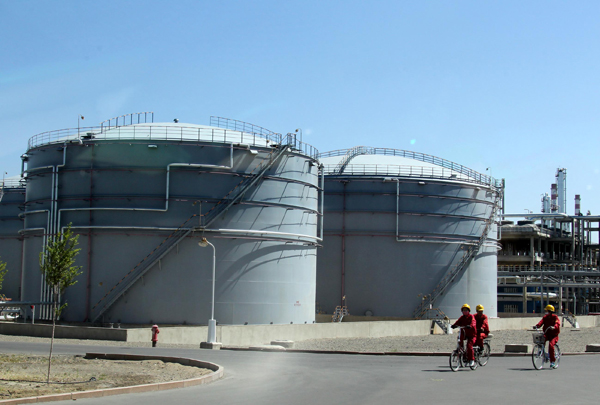Nation edges toward ending State monopoly on oil
China is inching closer to ending the State monopoly in the oil sector after it allowed a Xinjiang-based private energy firm to import crude oil, industry sources said on Wednesday.
Guanghui Energy Co Ltd, the largest private firm in Xinjiang, with a wide range of businesses covering energy, vehicles and real estate, has got the green light from the State Council, China's cabinet, to import crude oil, the China Business News reported on Tuesday quoting an unnamed company official.
The energy firm, which is the only non State-owned company in China with upstream oil and gas assets, is also seeking oil exploration rights to fully enhance its oil production chain.
A spokesman of the Xinjiang-based company, however, declined to comment on the issue.
Before 2011, China had been gradually increasing the amount of non-State imports to serve the few refineries that are not controlled by China's two State-owned refining giants.
"China is moving toward a milestone as the permission given to the Xinjiang-based company enables it to import crude oil directly from its overseas fields and also refine it in oil refineries not owned by the two oil majors - China National Petroleum Corp, or PetroChina, and Sinopec Group. What this means is that Guanghui Energy will now have more say in the upstream industry," said Yan Pengfei, a senior analyst at the industry services department of Guan Tong Futures Co Ltd.
The crude oil license of the gas and property conglomerate is mainly for its oil and gas fields in Central Asia, experts said.
In 2009, Guanghui Energy purchased a 49 percent stake in Kazakhstan's Tarbagatay Munai LLP for about 303 million yuan ($48.6 million) to develop an oil and gas field covering about 8,300 sq m in eastern Kazakhstan.
TBM, which owns the rights to resources near Lake Zaysan, has crude oil resources of about 1.1 billion tons and is ready to supply feed gas to an LNG plant in north Xinjiang's Jeminay County, Guanghui Energy said.
The move is also part of a broader policy reform that the cabinet put out in late May aimed at encouraging private capital in fields such as the infrastructure, telecom and oil and gas sectors.
"It is just the first step in further freeing up the crude oil import market to smaller and private energy players, as China prepares to welcome more privately run enterprises to compete with oil giants and optimize allocation of resources," said Lin Boqiang, director of the China Center for Energy Economics Research at Xiamen University,
China has fixed the 2014 crude oil import quota for non State-owned companies at 29.1 million metric tons. It also said that companies seeking crude licenses must have registered capital of at least 50 million yuan and access to crude receiving berths and storage facilities of at least 200,000 cubic meters.
Currently, about 30 non-State oil traders are qualified to apply for the crude oil quota, earlier reports said.
|
A facility of Guanghui Energy Co Ltd in Xinjiang. The business scope of the largest private firm in Xinjiang covers energy, vehicles and real estate. Cai Zengle / For China Daily |

























